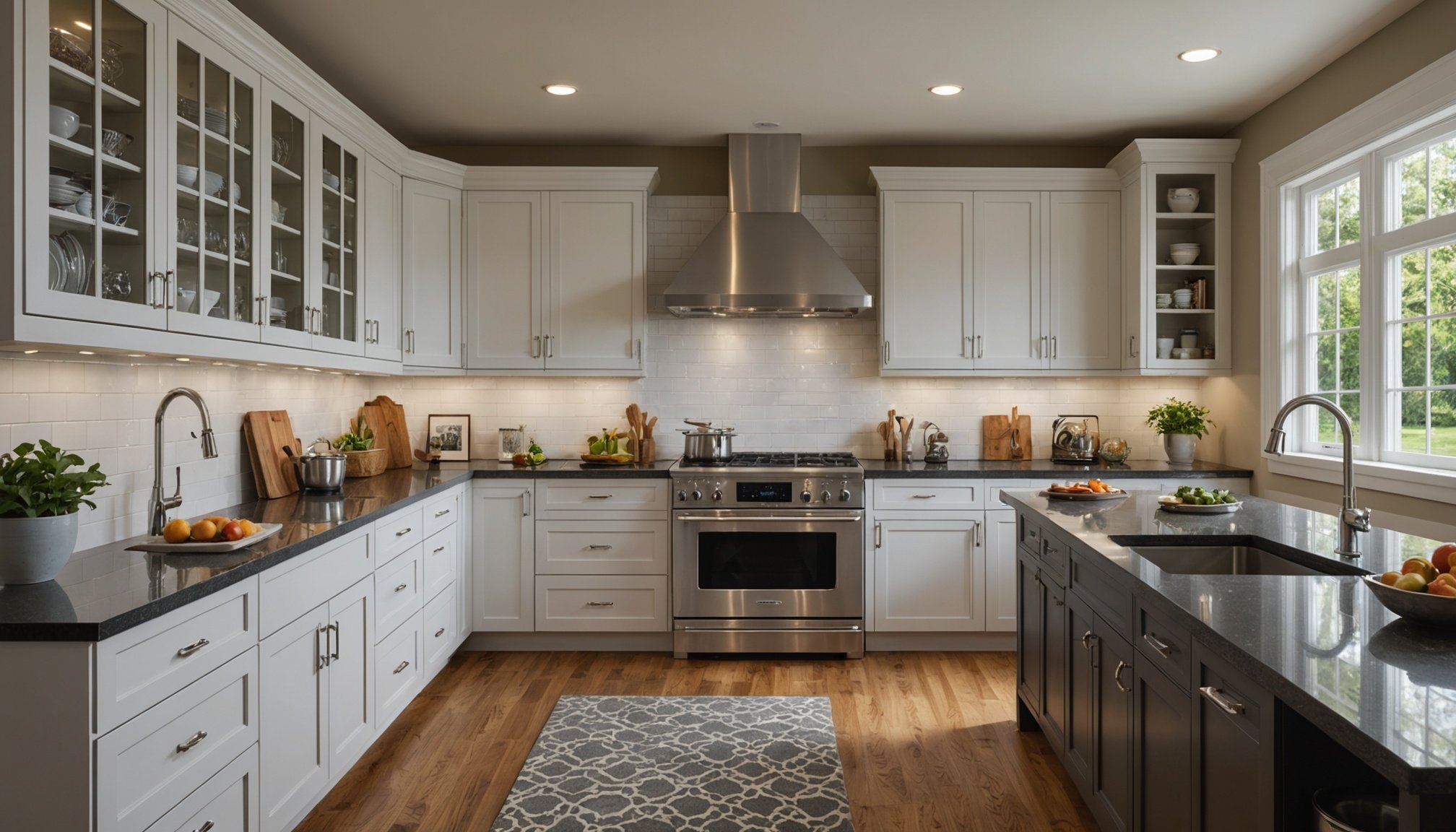Transform Your Kitchen: Harness Energy Efficiency with Smart Designs for Peak Usage Times
In the modern era, kitchens are no longer just about cooking; they are about efficiency, sustainability, and innovation. With the rise of smart technology, transforming your kitchen into an energy-efficient hub is more achievable than ever. Here’s how you can leverage smart designs and appliances to reduce your energy consumption, especially during peak usage times.
The Power of Smart Kitchen Appliances
Smart kitchen appliances are at the forefront of this transformation, offering a blend of convenience, energy efficiency, and enhanced functionality.
Also read : Discover the Fastest Heat Adjustment: Which Cooktop Type Reigns Supreme?
Convenience Redefined
Imagine preheating your oven while you’re still on your way home from work or asking Alexa to brew your morning coffee before you even get out of bed. Smart appliances make this possible through remote control and voice command capabilities. For instance, the GE Profile Smart Oven allows for voice-controlled operations and guided recipes, ensuring that even the most complex dishes are cooked to perfection with minimal guesswork[1].
Energy Efficiency
One of the most significant benefits of smart kitchen appliances is their ability to reduce energy consumption. These appliances are designed with eco-modes and precision cooking features that optimize power usage. For example, smart refrigerators like the Samsung Family Hub come with high-efficiency compressors and improved insulation, meeting Energy Star requirements while reducing energy waste[4].
Topic to read : The Complete Handbook on Selecting and Maintaining Eco-Friendly Quartz Countertops
How IoT and Smart Technology Optimize Energy Usage
The integration of Internet of Things (IoT) and smart technology in kitchens goes beyond simple automation; it creates an intelligent ecosystem that adapts to your needs.
Learning Usage Patterns
Smart appliances can learn your usage patterns and optimize power consumption during peak hours. This is particularly beneficial in reducing overall energy consumption. For instance, smart dishwashers like the Bosch Home Connect can be scheduled to run during off-peak hours, saving energy and water[1].
Advanced Sensors and Machine Learning
Connected kitchens use advanced sensors and machine learning algorithms to manage everyday cooking tasks efficiently. Smart cooktops offer precise temperature control and timing, ensuring consistent results. This technology also helps in inventory management, suggesting recipes based on available ingredients and tracking food freshness to reduce waste[2].
Eco-Friendly and Energy Efficient Appliances
Choosing the right appliances is crucial for achieving energy efficiency in your kitchen.
Green Stoves and Ovens
Induction stoves are significantly more efficient than conventional electric and gas stoves. Convection ovens, for example, use about 20% less energy than standard ovens. Self-cleaning ovens are also more efficient due to their insulation. General Electric offers freestanding electric range models with built-in Wi-Fi and smart home technology, making them both efficient and smart[4].
Energy Star-Certified Refrigerators
Energy Star-certified refrigerators, such as the Samsung Family Hub, feature high-efficiency compressors, improved insulation, and advanced temperature mechanisms. These refrigerators not only save energy but also provide smart features like internal cameras and meal planning apps[4].
Designing Your Kitchen for Energy Efficiency
The design of your kitchen plays a critical role in optimizing energy efficiency.
Multifunctional Spaces
Multifunctional sink stations are a modern kitchen feature that optimizes space and streamlines tasks. These stations can include cutting boards, garbage disposals, drying racks, and food waste composting stations, making cooking and cleaning more efficient and sustainable[3].
Smart Lighting and Water Systems
Incorporating smart lighting and water systems can further reduce energy consumption. Smart lighting can adjust brightness based on natural light availability, while smart water systems can optimize water usage during cooking and cleaning.
Practical Tips for Achieving Energy Efficiency
Here are some practical tips to help you transform your kitchen into an energy-efficient space:
Use Smart Appliances Wisely
- Schedule Appliance Use: Use smart appliances to schedule tasks during off-peak hours to reduce energy consumption.
- Monitor Energy Usage: Use apps to monitor your energy usage and adjust your habits accordingly.
- Choose Energy Star-Certified Appliances: Opt for Energy Star-certified appliances to ensure they meet high energy efficiency standards.
Optimize Your Kitchen Design
- Natural Lighting: Design your kitchen to maximize natural lighting, reducing the need for artificial lighting.
- Efficient Storage: Use efficient storage solutions to reduce food waste and optimize meal planning.
- Smart Grid Integration: Consider integrating your kitchen appliances with a smart grid system to optimize energy usage based on real-time energy prices.
Benefits of Energy Efficiency in Your Kitchen
Health and Sustainability
Smart kitchens serve as health and sustainability hubs. Advanced sensors can track nutritional content, suggest healthier cooking methods, and help maintain dietary goals. By reducing food waste through better inventory management and storage optimization, smart kitchens contribute to a more sustainable lifestyle[2].
Cost Savings
Energy-efficient appliances and smart designs can significantly reduce your energy bills over time. For example, using an induction stovetop instead of a conventional electric stove can save a substantial amount of energy, leading to lower electricity costs[4].
Overcoming Implementation Challenges
While the benefits of smart kitchen appliances are clear, there are several challenges to consider:
Initial Costs
The initial cost of smart appliances can be a barrier. However, modular solutions are emerging that allow for gradual upgrades, making it more accessible to integrate smart technology into your kitchen[2].
Privacy and Data Security
Privacy and data security are primary concerns when integrating smart technology. Ensuring robust encryption and secure data handling protocols is essential to protect your personal data[2].
Interoperability
Interoperability between devices from different manufacturers is another challenge. However, industry standards are becoming more unified, making it easier to integrate devices from various brands[2].
Transforming your kitchen into an energy-efficient space is not just about installing smart appliances; it’s about creating a sustainable and efficient ecosystem. By leveraging IoT technology, choosing eco-friendly appliances, and designing your kitchen with efficiency in mind, you can significantly reduce your energy consumption and contribute to a more sustainable future.
As you embark on this journey, remember that small changes can add up over time. Whether you start with a smart coffee maker that brews your coffee exactly when you need it or invest in a smart refrigerator that manages your meals and schedules, every step towards energy efficiency is a step in the right direction.
Detailed List of Smart Kitchen Appliances
Here is a detailed list of smart kitchen appliances that can help you achieve energy efficiency:
-
Smart Refrigerators:
-
Example: Samsung Family Hub
-
Features: Internal cameras, meal planning apps, family calendar, and more
-
Benefits: Reduces food waste, helps manage meals and schedules[1].
-
Smart Ovens and Ranges:
-
Example: GE Profile Smart Oven
-
Features: Voice-controlled operations, guided recipes
-
Benefits: Precision cooking, fewer overcooked meals[1].
-
Smart Dishwashers:
-
Example: Bosch Home Connect
-
Features: App scheduling, water-saving features, super-quiet operation
-
Benefits: Efficient, quiet, and environmentally friendly[1].
-
Smart Coffee Makers:
-
Example: Keurig K-Supreme Plus SMART
-
Features: Custom brewing, scheduling, brew strength adjustment
-
Benefits: Perfectly brewed coffee, timed exactly when needed[1].
-
Smart Blenders:
-
Example: Vitamix A3500 Ascent Series
-
Features: Wireless connectivity, pre-programmed settings, app integration
-
Benefits: Precision blending, tailored smoothie recipes[1].
Comparative Table of Energy-Efficient Appliances
| Appliance | Energy Efficiency Features | Benefits |
|---|---|---|
| Samsung Family Hub | High-efficiency compressors, improved insulation | Reduces energy consumption, manages meals and schedules, reduces food waste[4] |
| GE Profile Smart Oven | Voice-controlled operations, guided recipes | Precision cooking, fewer overcooked meals, energy-efficient[1] |
| Bosch Home Connect | App scheduling, water-saving features, super-quiet operation | Efficient, quiet, environmentally friendly, reduces energy consumption[1] |
| Keurig K-Supreme Plus SMART | Custom brewing, scheduling, brew strength adjustment | Perfectly brewed coffee, timed exactly when needed, energy-efficient[1] |
| Vitamix A3500 Ascent Series | Wireless connectivity, pre-programmed settings, app integration | Precision blending, tailored smoothie recipes, reduces energy waste[1] |
Quotes from Experts
- “Smart kitchen technology represents a paradigm shift in how we approach cooking. Rather than simply digitising existing appliances, IoT integration creates an intelligent ecosystem that understands and adapts to users’ needs.” – [How IoT and smart appliances are redefining cooking spaces][2]
- “The true potential of smart kitchens emerges when multiple devices work in harmony. This synchronised ecosystem creates a seamless cooking experience where inventory management becomes automated, significantly reducing food waste.” – [How IoT and smart appliances are redefining cooking spaces][2]
- “The kitchen of tomorrow promises to be a space where efficiency meets tradition, where technology enhances rather than diminishes the joy of cooking.” – [How IoT and smart appliances are redefining cooking spaces][2]
By embracing these smart designs and appliances, you can create a kitchen that is not only efficient but also sustainable and eco-friendly, setting you on the path to a net zero energy home.

